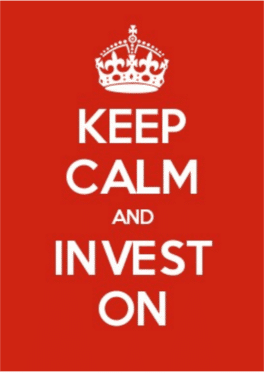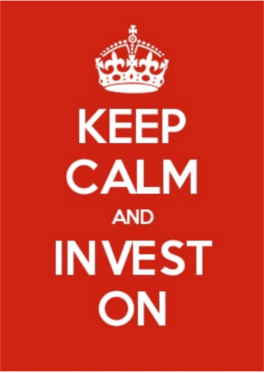Brexit Lessons: Keep Calm and Invest On
July 8th, 2016 | 2 min. read

 On Thursday, June 23 British citizens voted in a national referendum to secede from the European Union. The shock of “Brexit” reverberated across financial markets around the world.
On Thursday, June 23 British citizens voted in a national referendum to secede from the European Union. The shock of “Brexit” reverberated across financial markets around the world.
While it’s understandable to ask yourself, “What should I be doing about this?” (and there’s plenty of financial pundits offering their answers in the news), the better question for retirement investors is “What can I learn from this?”
There are two important lessons to learn: (1) the special role a financial adviser plays and (2) don’t let current events guide your decisions.
The excitement surrounding Brexit brings to mind the iconic motivational poster that reads: “Keep Calm and Carry On.” It was created by the British government in 1939 to boost public morale as the country prepared for World War II.
Although nearly 2.5 million posters were printed, very few were publicly displayed. It was largely forgotten until 2000 when a used bookshop found one in a box of old books. Since then, the slogan and design has become an international sensation.
Lesson 1: Keep clam: the special role of financial advisers
Retirement investors can take heed. In the face of uncertainty and increased volatility, Keep Calm and Invest On.
Emotions can get the best of us; especially, when it comes to money. That’s why one important job of a financial adviser is to help coach investors, to be a source of reassurance during difficult times and allay their fears so they stay on track toward their long-term goals.
Those who quickly react to market events risk selling as the market falls and buying as the market rises. That behavior essentially locks in your losses and makes it harder to recover.
Volatility can be a good thing for young investors. For example, as you consistently put away money into a 401(k) every month, you will essentially buy assets when they are low priced and profit when they recover. Meanwhile, retired investors should be in a balanced portfolio that can help protect them from wild market swings yet still capture some gains.
Lesson 2: Invest on: tune out current events
That brings us to the second lesson: don’t make investment decisions based on current events.
While the stock market and the media scrambled to makes sense of the referendum results, it likely happened too fast to register on the average investor’s conscience.
Within a week, stock markets recouped nearly all their losses. The Dow Jones Industrial Average ended the quarter on June 30 up 2.9% for the year while the S&P 500 was up 2.7%. Investors could restfully enjoy their Fourth of July holiday, which, of course, celebrates our independence (or should we say, “Amexit”) from the monarchical rule of Great Britain.
At this time, it is impossible to know the long-term ramifications of Brexit. Global growth may slide, central banks may provide more stimulus, the Federal Reserve may delay interest rate hikes even longer. Or, we may not see much of anything. The political and negotiation process to officially remove Britain from the EU could take two years or more, which may be plenty of time for investors, banks, markets and world economies to adjust.
We can’t predict the future and never pretend that we do. All we can do is recommend that you have a portfolio that is aligned with your long-term goals, work diligently to stick with your financial plan and make sensible moves only when necessary.
So, Keep Calm and Invest On.
Advance Capital Management is a fee-only RIA serving clients across the country. The Advance Capital Team includes financial advisers, investment managers, client service professionals and more -- all dedicated to helping people pursue their financial goals.
